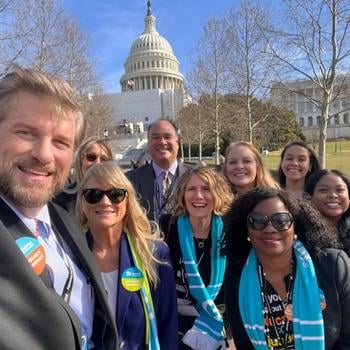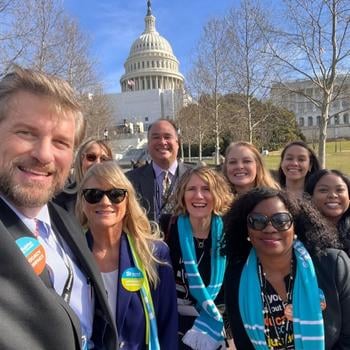Habitat Advocates at the Capitol
March 16, 2023 Habitat News Advocacy

We’ve said it before: advocacy matters. Homebuilding and housing improvements begin long before tool belts are tightened. They begin with public policy that fosters housing justice, supply, and opportunity. And that, ultimately, begins with you – the constituents to whom our leaders are accountable. It’s why we advocate, so that our voices are loud and clear in support of affordable homeownership.
There are few times that make this power clearer than the days when Habitat advocates descend en masse upon the Capitol – for Habitat on the Hill in Washington, D.C., and for Advocacy Day in Sacramento. This year was especially electric, as the first time either of these events has taken place in person in a few years. 
Habitat on the Hill brought about 400 Habitat leaders, staff members, board members, and homeowners from around the country to Washington, D.C. in early February. They sat down with legislators to discuss the priorities that Habitat for Humanity supports on a federal level in order to address the supply shortage of safe, affordable homes for homeownership – a common denominator in communities across the country. Chief among these priorities are the Neighborhood Homes Investment Act, which would use federal income tax credits to mobilize private investment to build and substantially rehabilitate homes for low- and moderate-income homeowners, and securing appropriations that are critical to the production of more affordable homes.
You can call on your own congressional representatives to invest in affordable homeownership supply in just a few clicks, here!
“Habitat, overall, is getting a lot of recognition in the advocacy space,” said Debbie Arakel, Executive Director of Habitat for Humanity California. She attributes this recognition to two factors. “First, we have now, as a collective organization on the national stage, been doing this for a number of years. And, two, the crisis is so extreme and the housing supply shortage is so extreme, and legislators and leaders are seeing this at every income level. It’s not an isolated situation. Now, their children and their grandchildren can’t afford to buy a home, wherever they live. It’s not just a California problem or a New York problem.”
Most of all, though, as Debbie points out, “The affordable homeownership model really does work. There’s Habitat’s track record, and it’s not just us. There is an acknowledgement that homeownership is a viable and a positive solution that can really work.” We are still a long way, however, from our goal of people “thinking of homeownership when you think of affordable housing. There’s still a lot of education needed and a lack of understanding that affordable homeownership should be part of the overall investment in affordable housing.”
Closer to home, we kicked off March with Advocacy Day in Sacramento. Of California’s 33 Habitat affiliates, 22 sent delegations to the capital to make our voices heard in support of affordable ownership housing in our state. Habitat East Bay/Silicon Valley sent our President and CEO, Janice Jensen, Communications Manager Patti Wang Cross, and Board members Vince Salinas, Shannon Adkins, Brian O'Shea, and Annie Kao. Specifically on the table, we were building support to restore $100 million in funding for CalHome in the upcoming state budget. Last year, we won a major victory by securing state budget funding for CalHome for the first time in history – only to have the coming year’s $100 million allocation cut from the draft budget. “CalHome is a big deal,” Debbie says, “because it’s the one and only single state program that helps build affordable homes to buy. It increases supply, and there’s no other program that provides funding to actually increase supply.”).jpg?width=500&height=419&name=Untitled%20(Facebook%20Post%20(Landscape)).jpg)
First, though, we met for a day of knowledge sharing and messaging, hearing from experts like Holly Fraumeni de Jesus of Lighthouse Public Affairs and David Garcia of the Terner Center about the current state of the housing crisis and the power of policy to affect it. Tiena Johnson, Executive Director of the California Housing Finance Agency, shared her own experience at different points on the housing continuum – moving from housing insecurity to finding affordable housing to being able to purchase a home. “The moment I figured out that I had a safe and decent place to live – I will never, ever forget it,” she shared. “It changed my life. It changed my children’s life. And it will change my grandchildren’s lives. Let’s not forget who we’re working for.”
Assemblymember Buffy Wicks, chair of the Assembly Housing Committee, addressed the Habitat delegates with her own housing biography, from her early life in a trailer park in the Sierra Nevadas, to watching to her parents eventually accumulate enough savings to buy land and then build a home. She described this as “a ladder up, and for so many people that dream is no longer really an opportunity, especially in California.” She went on to say, “The work that you all are doing to give people their dream, to allow them to be self-realized and actualized to their fullest potential, to have the housing security that they deserve, is so critical. I cannot overstate how important the work that you all do is.”
It was with that faith in the potential of affordable homeownership that we met with legislators the following day, representatives of districts up and down the state. We were united in a single ask: support the restoration of $100 million in budget funding for CalHome.
At the end of the day, Janice Jensen – Habitat East Bay/Silicon Valley’s President and CEO – shared that our own meetings left her feeling optimistic. We had secured some “confirmations from legislators who were willing to sign on in solidarity with us, which is fantastic. Others were holding back a little bit, but they understood the need. And, to me, that is a big deal, to have people truly understand the critical nature of this funding.”
However, as Janice points out, “It’s a tough budget year for the state, so we still have a lot of work to do. This is step number one. We’ve got a long road. But, for today, in step number one – I think it was a really wonderful day.”
Habitat on the Hill and Advocacy Days are an opportunity for the Habitat community to gather and learn from each other, and develop cohesive messaging and strategies for building support among our lawmakers. We have an opportunity to share the importance and impact of our work. And, as Debbie Arakel says, “Now, we have decades of Habitat homeowners. There are children and young adults who have grown up in Habitat homes. There are a lot of evidence and real-life cases and situations that we can draw on.” In the end, there is no better argument for making homeownership more affordable and attainable than the people who have built opportunities upon those foundations. And if that’s not a reason to advocate, we don’t know what is.
Join the Conversation
Leave Us a Comment!
We love hearing from our community. Let us know what you think by leaving us a comment below.